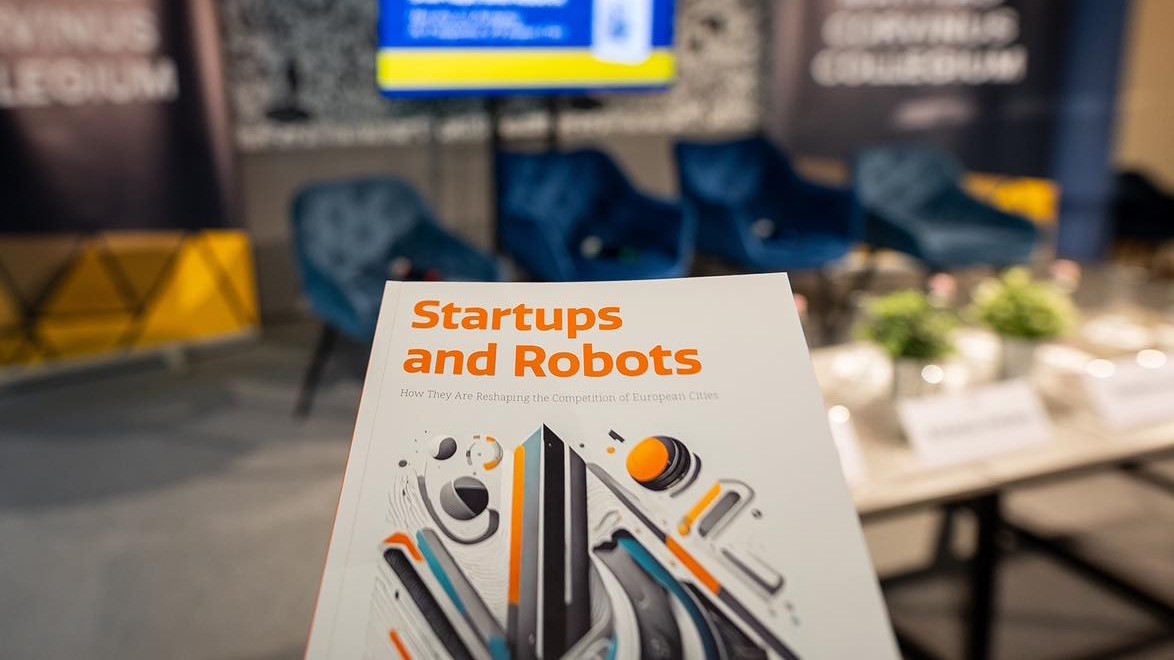For every young researcher, it is an almost lifelong experience to see the results of their research in print for the first time. This opportunity was provided on 12 September at a book launch where the student researchers of MCC’s Centre for Next Technological Futures presented and discussed their findings with invited guests, Director Barbara Kolm (Austrian Economics Centre, Vienna) and Senior Researcher Antonio Vezzani (UNCTAD, Geneva). The English-language study volume, Startups and Robots: How They Are Reshaping the Competition of European Cities, summarizes the fact-based research of the Centre from the past two years, which is based on large datasets and has already been presented by the student researchers at several international conferences. In addition to international conferences, the research work also drew heavily on the students’ study trips to leading startup ecosystems around the world (including Silicon Valley, Toronto-Waterloo, Singapore, Israel, Washington DC, London, and Paris).
Csaba Johanyák’s analysis, based on thousands of investment transactions and mathematical models, examined the role of geographical distance in venture capital investments. According to his study, although geographically distant investors inevitably come to the fore as a startup grows, locally available venture capital is crucial in the early stages of a startup.
Orsolya Székely’s study, based on interviews examining the startup ecosystem in Munich, specifically the operation of startup accelerators, concluded that these accelerators are mostly similar in their basic service packages, but differ significantly in their sectoral and geographical focus.
In contrast, Viktor Lázár’s study compared accelerators operating on a purely market basis with those considering Environmental, Social, and Governance (ESG) factors. While the former applies very strong market selection, ESG accelerators offer a much broader range of mentoring and programmes. In another study, Viktor Lázár analyzed innovation indicators to explore in which US states Central and Eastern European startups, as well as small and medium-sized enterprises, can establish mutually beneficial innovation partnerships.
Mathias Corvinus Collegium – MCC
Az MCC-s kutató diákok, Székely Orsolya, Johanyák Csaba, Lázár Viktor és Ujvárosi Máté, valamint tanáruk, Cséfalvay Zoltán tanulmányaival bemutatták a Startups and Robots című kötetet. Lánczi Péter…
Professor Zoltán Cséfalvay, head of the Centre, analysed around 20,000 growth-stage startups and pointed out that—if we look at the number of startups and the capital they have raised—two trends are visible in the startup geography of Europe. On the one hand, the vast majority of startups and raised capital are concentrated in just a dozen cities. On the other hand, Europe’s map reveals a sharp North-South and West-East divide, with Southern and Central-Eastern Europe lagging significantly behind, though this is slightly mitigated by sectoral specialization, such as in Industry 4.0 technologies.
Viktor Lázár and Máté Ujvárosi’s study addressed the question of which factors influence the application and spread of the more than four million industrial robots in use worldwide, and in European countries. According to their research, while the difference between the purchase and operational costs of robots and the labour costs they replace is the determining factor, sectoral specialization also plays a significant role, especially in industries (automotive, electronics) where the use of industrial robots is widespread. In this context, Zoltán Cséfalvay’s study highlighted two fundamental types of robotization: industrial robots, which are now used on a large scale but are concentrated in only a few sectors, and service sector robots, whose application areas are very broad, though their usage is still in its infancy.
During the panel discussion at the book launch, in response to questions from Laura Antal and Ábel Somogyi, Barbara Kolm highlighted the negative role of regulatory barriers in the gaps seen in Europe’s startup geography, while Antonio Vezzani emphasized the positive opportunities offered by European programmes. However, both agreed that sectoral specialisation could help Central and Eastern European startups catch up. Kolm and Vezzani also stressed the importance of institutions in catching up, especially the integration of accelerators and universities. According to Barbara Kolm, venture capital goes where marketable ideas and talent are found, while Antonio Vezzani agreed, emphasizing that locally available capital can be indispensable for startups in their early stages. In the debate on robotization—although attention generally focuses on employment impacts—the positive economic effects, such as the growth of the economy and productivity in highly robotized sectors, were highlighted.
The e-book is available to purchase at Libri and Amazon.
Related articles:
Source: Hungarian Conservative/MCC







